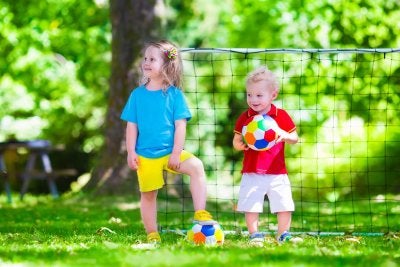-
Library Do’s and Don’ts for Kids
Visiting the library is a fun way to encourage your kids to love to read. When your child is working on Kindergarten reading in Pembroke Pines , going to the library to find books to supplement what he or she is learning in the classroom is a perfect way to show your child the world of reading for pleasure.
Help your kindergarten-age child get the most from his or her library experience by teaching the rules in this video before you go. The library is not the place for running or loud noises. Show your child how to treat books with respect and only handle them with clean hands. The library can become a favorite family destination and a good resource for supporting Kindergarten reading once your child learns the rules.
-
Raising a Young Scientist
There are many ways to encourage your child to enjoy science and learning about the world around her. Speak with her Pembroke Pines pre-kindergarten teachers about different educational tactics, and speak with your child about different ways she would like to learn. Perform experiments with each other and have fun researching different topics. Read on for more information about how to raise a young scientist.

Encourage Curiosity
Children are naturally curious and always have questions about how the world works. This natural curiosity is a great gift for your child, so encourage it however and whenever you can. Answer your child’s questions and engage in a dialogue to begin developing her critical thinking skills. If you do not know the answer to a question, then take the opportunity to research together. Ask her pre-k teacher, check out library books, and search websites on the internet. This experience will show your child the value of research and learning.
Speak with Eloquence
Many people speak down to children, because they believe children will not or should not understand an adult conversation. However, children are much smarter than some adults give them credit for, and they can understand complicated situations in much simpler terms. You can help your child foster her communication skills early by speaking to her with eloquence. Treat her like an equal and do not shy away from large words or complicated terms.
Engage in Experiments
There are so many science experiments that can be done at home or in your child’s pre-kindergarten class. These activities are fun and engaging, and you can create a dialogue about how different scientific elements work. For example, you can grab a variety of items and see which ones will float or sink in a bucket of water. Have your child guess which object will float or sink and have her place each one in the water. This can be a wet and silly experiment that will also teach your child more about water and how it reacts to everyday objects.
-
Helpful Homework Habits
Homework is an important task in every child’s early education. It helps them retain the concepts they have learned, and it enforces accountability outside of school. There are many ways to create helpful homework habits after children leave school. Enrolling them in afterschool programs in Pembroke Pines encourages homework help, and creating the right environment at home will reinforce the importance of homework. Here are a few habits that will help children with their homework:
- Keep a routine time and place that children can do their homework. If they participate in an afterschool program, then they may finish their homework before coming home. If they do not, then set aside a quiet place that children can work.
- Observe the different ways that children respond to homework and adjust accordingly. If a child becomes easily distracted, then work together to eliminate and overcome the distractions.
- Always maintain contact with the teachers. Early education teachers and parents can communicate to understand how children respond at home versus at school. This communication can help prevent future problems with understanding concepts or behavioral issues.

-
How Can I Get My First-Grader to Eat Vegetables?
If you have been struggling with your Pembroke Pines first-grader’s eating habits, then it is time to learn new tactics. You can help your child eat more vegetables by packing snacks to take to his first-grade class and masking vegetables with other foods. Let’s take a closer look at some easy ways to get your first-grader to eat vegetables.

Encourage the “One Bite” Rule
The “one bite” rule is a simple way to encourage your child to try new foods. He must take one bite of the vegetable he does not like before he can say no to eating it. This rule can prevent your child from vetoing new foods based on their look or smell before ever tasting them.
Make Vegetables into Snacks
If your child is hungry throughout the day, then that is the perfect time to encourage him to eat healthy vegetable snacks. Do not stock your refrigerator or pantry with chips, sweets, or over-processed foods. Instead, pack small, sealable cups with a variety of vegetables and salad dressing, hummus, or peanut butter that your child can grab whenever he wants. He can also bring these snacks to his first-grade class for lunches and snack time.
Mask Vegetables in Other Foods
You may help your child to get his daily allowance of vegetables by disguising them in other foods. You can cut vegetables into small pieces that will blend in with other foods. You can also puree many vegetables, such as spinach or sweet potatoes, and add them to sweets like brownies and cookies. Your child may also respond to eating his vegetables by dipping them into dressings or cheese.
Cook Meals with Your Child
It is important to include your first-grader in your cooking habits, because he can learn how to measure for his first-grade math skills. However, cooking with your child will also help him to eat his vegetables. If he has taken part in making the meal, then he is likelier to want to eat what he made.
-
Try These Sensory Activities at Home
Sensory activities are important to help your children explore their curiosity, learn more about their world, and develop critical thinking skills. Many of the activities found in the attached video can be done at home, in an afterschool program, or early childhood learning center near Pembroke Pines . Here is a better look at some fun and creative sensory activities to do with your children:
- Gather small toys that your preschool age child will love. Freeze the toys, in layers, and give your child some tools to break through the ice. This is a fun experience that can teach your child patience.
- Cook up pastas and have your children add food coloring. This creative exercise will teach them how to mix colors to make new colors.
- Place ivory hand soap into the microwave, and it will come out in interesting shapes that your children can touch and add coloring to.
-
Positive Parenting: How to Set and Enforce Limits During the School Year
Creating a solid foundation of expectations for your child can help promote his good behavior and success in school. If your student is preparing to enter first grade in Pembroke Pines this year, then read on for advice on using positive parenting to set and enforce limits that can promote a great school year.

Give Explanations
Setting boundaries is important for teaching your child what is expected of him. However, kids may become argumentative or defensive if you make rules without offering reasons for them. To help avoid this, set limits while using words rooted in positivity and let your first grader know why each limit is needed. For example, instead of instructing your child not to play with his toys when he should be getting ready for school, tell him when he should play with them and why.
Enforce Consequences
When it comes to promoting the behaviors you want to see in your child, following up with appropriate consequences for both good and unwanted actions is key. Otherwise, if positive behavior is overlooked or disruptive behavior is ignored, then your first grader may find it difficult to understand what it is that you want him to do. For example, simply thanking or praising your child when he does what you have taught him to without being told each time is an excellent way to reinforce good behaviors. In situations when your child ignores instructions or behaves disruptively, you can, for example, institute quiet time, remove toys, or take away privileges as consequences.
Work Together
Setting rules and deciding how you will enforce them doesn’t have to be a one-sided task. By discussing and making boundaries and consequences with your first grader, you can help him gain a better understanding of why certain behaviors are appropriate or not. Frame conversations like these in a positive light by avoiding negative words. Additionally, consider putting limits in writing with your child’s help, and then posting them in your home as a reminder for both of you.
-
Your 4-Year-Old’s Cognitive Milestones
Developmental milestones refer to different things that children can typically do by a specific age. If your child is entering pre-kindergarten in Pembroke Pines this year, then you can monitor his problem-solving, thinking, and learning development by understanding and watching for the cognitive milestones for 4-year-olds.
By the time they enter pre-k or reach age 4, most children grasp the concept of counting, have some understanding of time, and can recognize when things are different or alike. Also, pre-kindergarten students are often able to play card or board games, remember aspects of a book, and guess what may happen next in a story. By age 4, many children also start to use scissors, draw figures with 2 to 4 body parts, and copy capital letters.
Monitoring how your pre-k student moves, learns, speaks, plays, and behaves can help you check off these cognitive milestones and keep his doctor updated about his level of development.

-
Top Tips for Transitioning from Summer Camp to School
The days are getting shorter, and the temperatures are dropping. For parents and students, these changes mean the end of summer break and the beginning of a new school year. If your child is enrolled in summer camp in Pembroke Pines , then continue reading for tips on helping her with the transition to school this fall.

Get Back on Schedule
Even though your child is keeping busy at summer day camp and benefiting from regular mental stimulation, there is a good chance that she, like many other students, is in a summertime mindset that may make it difficult for her to get back into learning mode. One way to help prepare your child for the transition from camp to school is to make a gradual return to a normal schedule. For example, you might get her back on a good bedtime schedule or set aside time for learning that will be replaced with homework once the semester begins.
Spend Time in Nature
For kids in summer camp, their break from school means lots of time spent outdoors surrounded by and experiencing nature. To make the transition back to a classroom setting an easier one for your child, think about how you can incorporate outdoor activities into your normal routine. To do this, you could start taking daily walks to the park, arranging weekend day trips to the forest, or helping your child start her own backyard garden.
Talk About Any Fears
Some kids are always excited about going back to school. Others, however, face anxiety about entering a new classroom setting. If your child experiences fear about leaving summer camp and beginning a fresh school year, then set aside time to address her worries, and speak with her about the fun experiences she should look forward to and all the friends she can make. Finally, you can even approach this with a role play technique by setting up a classroom at home and arranging learning activities for you and your child to complete together.
-
Getting Back to Nature in Childhood
Whether through an after school program in Pembroke Pines , time spent in the backyard, or activities that you arrange for your family, allowing your child to enjoy unstructured play outdoors offers many benefits. Watch this video to learn about the importance of getting back to nature in childhood.
Today, many children are spending less time outside than ever, which may have an impact on their development. For example, executive functions like critical thinking, problem-solving, and organizing are best-developed in outdoor, unstructured play environments. Also, researchers know that the brains of children are developed in a more critical way when exposed to an outdoor setting. Finally, when outside and playing with peers, children tend to utilize critical social skills and competencies that they may not in an indoor, structured play environment.
-
Packing Snacks for Your Summer Camper
Summer camp is practically a rite of passage for kids. In Pembroke Pines, summer day camps feature lots of fun activities and opportunities for kids to make new friends. Unfortunately, it can be difficult for parents to get children to eat healthy foods while at summer camp. The trick is to make healthy snacks look fun to eat. You can see some demonstrations of this when you watch this interview with a registered dietitian.
She explains what she looks for in a healthy snack—primarily a combination of lean proteins and complex carbohydrates to give your child the energy needed for summer camp activities. For instance, you can add a little mustard to some low-sodium turkey slices, and wrap them around a thin, whole grain breadstick. Pack pepper strips and carrot sticks to dip into some low-sugar, plain or vanilla Greek yogurt. You could also stuff some granny smith apples, cinnamon, and low-fat ricotta cheese into a whole grain pita pocket.
RECENT POSTS
categories
- Uncategorized
- Early Learning Center
- Pre-K
- Children
- Child Care Center
- Preschooler
- Preschool Blog Category | Tanglewood Academy
- Preschool Lunch
- Tanglewood Academy
- After-School Program
- Toddler School
- Early Childhood Education
- preschool activities
- pre-kindergarten
- childhood education
- pre-kindergarten programs
- Children’s education
- enrichment opportunities
- Kindergarten
- Nurturing Education Environment
- Toddler Care
- Child Separation Anxiety
- Toddlers
- Summer camp
- summer activities
- VPK
- Voluntary Pre-K
- Outdoor Activities
- Smart Strategies
- Tie Shoes
- Snacks
- Physical Activities
- Education
- Enrichment Activities for Kids
- Early Education Activities
- Preschool Curriculum
- Classroom Learning
- APPLE accreditation
- Language Comprehension
